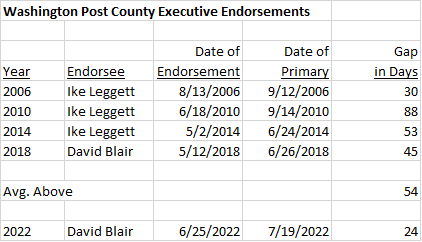By Adam Pagnucco.
It’s time for a crazy thought. Here goes:
Did the Washington Post help Marc Elrich get reelected?
I can just hear you now. “I have been reading your dreck for years Adam, but now I have proof that you’re nuts. The Post hates Elrich! They always have and they always will.”
Maybe you are right. Elrich has legions of enemies, but few if any are more persistent – and more dangerous – than the Washington Post editorial board. Over many years, the two have been on opposite sides on some of the Post’s top concerns, including the power of the county employee unions and the construction of big road projects like the Intercounty Connector and Governor Larry Hogan’s I-270 project. The Post demonstrated its continuing contempt for Elrich with a blistering endorsement of his primary opponent, David Blair, which blasted Elrich as much as it praised Blair.
This is all very ironic considering the fact that the Post’s own actions may have contributed to Elrich’s reelection.
Why would I say that? Let’s begin by looking at the timing of the Post’s endorsement of Blair, which came on June 25. The table below shows the date of the Post’s endorsement in the last five Montgomery County executive primary elections. In the four primaries prior to this year, the Post endorsement was made an average of 54 days before election day. This year, the Post endorsed Blair 24 days before election day, the smallest gap in the time period.

The lateness of the endorsement turned out to be extremely meaningful given the timing of mail ballots. The state’s election calendar shows that it began sending mail ballots to voters on June 4. That means some voters could have begun voting just a few days later and weeks before the Post’s endorsement of Blair was released on June 25.
Now let’s look at the timing of when mail ballots were counted in the original count. The county Board of Elections (BOE) did not use a first-in-first-counted procedure. Its selection process was more complicated than that. But since it often took a week or more to log in mail ballots – a necessary step before they could be tabulated – the first ballots to be counted would have disproportionately excluded mail ballots that were cast late. That’s important because Blair won the votes that were cast during early vote and on election day, periods long after the Post’s endorsement was released.
The table below compares mail and provisional vote tabulations on the first two days of counting vs all of the following days of counting.

On days 1 and 2, Elrich creamed Blair and overtook the lead Blair built in early vote and on election day. For an election that was essentially a statistical tie, there is no way that this could be a coincidence – it reflects a skew towards early mail votes, some of which were cast before the Post’s endorsement was published. The remaining votes produced a tiny margin for Blair which could not overcome Elrich’s edge on days 1 and 2.
Ultimately, the election was decided by just 32 votes. If the Post had endorsed Blair just as mail ballots were being sent to voters, those voters would have had an opportunity to know about the Post’s choice before they voted. That could easily have netted Blair another 32 votes, especially given the Blair campaign’s energetic efforts to publicize the Post’s support.
Another factor is that the Post’s demolition of Elrich was quoted in attacks on the incumbent by both Blair and the Affordable Maryland PAC, an outside group founded to defeat Elrich. An earlier Post endorsement could have been used in earlier attack ads, which could also have picked up another 32 votes. Even a couple more days of such ads could have made a difference.
In an election this close, one could blame dozens of factors for the outcome. But this particular factor is both clearly important and supported by evidence of its impact.
Elrich should thank the Post for its tardiness. If nothing else, it would make for an entertaining letter to the editor!
